ACT I
Catfish Row, a tenement neighborhood of Charleston, South Carolina, in the 1920s. The inhabitants of Catfish Row are relaxing after a day’s work. Clara sings a lullaby to her baby. The drug-dealer Sportin’ Life, Clara’s husband Jake, and some of the other men are playing craps under the disapproving eye of the religious Serena. Jake sings a lullaby of his own to the baby.
The disabled beggar Porgy arrives and is about to join the game when Crown and his partner Bess appear. The loudmouthed Crown joins the dice game. Drunk and high on drugs, he loses, starts a fight, and kills Robbins with a cotton hook. Before the police arrive, Crown runs off to hide, telling Bess that he’ll be back for her. The community shuns Bess as they await the arrival of the police. Sportin’ Life offers to take her to New York with him, but she refuses. Only Porgy is sympathetic to her: He offers her shelter and his protection, which she accepts.
In her room the following evening, Robbins’s widow Serena leads the mourners at her husband’s funeral. A collection is being taken to meet the cost of the burial. Porgy and Bess enter, and Bess offers Serena a contribution which at first she refuses thinking it must be Crown’s money. She finally accepts is when it is explained that it is Porgy’s.
The police officers arrive and accuse Peter the Honeyman of the murder. Fearing what might happen, he tells them that Crown was responsible but is himself promptly arrested as a material witness.
Serena convinces the undertaker to bury Robbins for less than his usual fee. Bess leads everyone in an exultant spiritual.
A month later, Jake and the other fishermen are mending their nets. Porgy compares his life to theirs. Sportin’ Life enters, but before he has an opportunity to peddle any of his “happy dust,” Maria, the matriarch of Catfish Row, chases him away. “Lawyer” Frazier sells Bess a divorce, even though she and Crown were never married.
Everyone is preparing to leave for a church picnic on Kittiwah Island. Sportin’ Life asks Bess again to come to New York with him and tries to give her more dope, which she refuses. Porgy threatens him and chases him off. He and Bess reflect on their newfound happiness. Porgy insists that Bess should go to the picnic without him. At first, she refuses, not wanting to leave him alone, but eventually, she yields to his persuasion and joins the others as they set off.
On Kittiwah Island, the evening of the same day, Sportin’ Life describes his own cynical view of religion to some of the revelers, until Serena chastises them for being taken in by his stories. The steamboat whistle announces that its time to leave, and everyone starts to pack up their belongings. Bess hurries along until Crown, who has been hiding on the island since the Robbins murder, calls out to her. He wants Bess to come with him, but she explains that she now has a new life with Porgy. Crown forces her to stay with him.
ACT II
In Catfish Row, at dawn a week later, fishermen leave for a day’s work at sea despite a storm warning. Bess is heard talking deliriously from Porgy’s room. She has been feverish and ill since returning from Kittiwah Island. Peter, released from police custody that morning, advises Porgy to take her to hospital, but Serena would rather pray for her recovery. Her prayers are answered: Bess emerges into the courtyard, free of the fever. She explains to Porgy that she wants to stay with him but that when Crown returns, she’ll be forced to go back to him. Porgy tells her that she doesn’t have to go with Crown, and he and Bess reaffirm their love for each other. The wind begins to rise and the hurricane bell sounds.
At dawn the following day, everyone cowers together in Serena’s room, and they pray for deliverance from the storm. Suddenly, there’s a knock at the door: It’s Crown seeking shelter and looking for Bess. She won’t go with him, insisting that she belongs to Porgy alone. He mocks Porgy and the frightened townspeople and counteracts their prayers for deliverance with a vulgar song. At the storm’s height, Clara sees Jake’s boat has overturned and rushes out to save her husband. Bess calls for one of the men to go after her. Crown is the only one to respond.
In Catfish Row the following night, the storm has passed. The women grieve for those who have been lost, including Jake, Clara and, it is assumed, Crown. Sportin’ Life appears, mocks their weeping, and hints that Crown is still alive. Bess is seen at a window lulling Clara’s baby to sleep. Under the cover of darkness, Crown steals in and approaches Porgy’s door. But Porgy is ready for him, strikes the first blow, and kills him.
The next afternoon, the detective returns to Catfish Row, accompanied by the coroner. They are investigating Crown’s murder, but their questioning of Serena and two other women draws a blank. They go to Porgy’s room and tell him he must come with them and identify Crown’s body. Horrified that he must look at Crown’s face, Porgy refuses to go and has to be dragged off.
Taking advantage of Porgy’s absence, Sportin’ Life tries to convince Bess that Porgy will be locked up for certain, and he attempts to lure her away to a new life. When Bess spurns him, he forces some dope on her and leaves more outside her door as he leaves.
A week later, the inhabitants of Catfish Row greet each other at the beginning of another day. Porgy returns from jail in jubilant mood: He distributes gifts that he has bought with money he won playing games of crap in jail. He is unaware of his friends’ discomfort as he calls out for Bess. Eventually, Serena and Maria tell him that Bess has gone to New York with Sportin’ Life. Hearing this, Porgy decides to follow her: He cannot live without Bess.
Place: Catfish Row, a fictitious large black tenement based on Cabbage Row, on the waterfront of Charleston, South Carolina.
Time: The early 1920s.
Act 1
Scene 1: Catfish Row, a summer evening
The opera begins with a short introduction which segues into an evening in Catfish Row. Jasbo Brown entertains the community with his piano playing. Clara, a young mother, sings a lullaby to her baby ("Summertime") as the working men prepare for a game of craps ("Roll them Bones"). One of the players, Robbins, scorns his wife Serena's demands that he not play, retorting that on a Saturday night, a man has the right to play. Clara's husband, the fisherman Jake, tries his own lullaby ("A Woman is a Sometime Thing") with little effect. Little by little, other characters in the opera enter Catfish Row, among them Mingo, another fisherman, and Jim, a cotton-hauling stevedore who, tired of his job, decides to give it up and join Jake and the other fishermen. Porgy, a disabled beggar, enters on his goat cart to organize the game. Peter, an elderly "honey man" [honey vendor] returns, singing his vendor's call. Crown, a strong and brutal stevedore, storms in with his woman, Bess, and buys cheap whiskey and some "Happy Dust" off the local dope peddler, Sportin' Life. Bess is shunned by the women of the community, especially the pious Serena and the matriarchal cookshop owner Maria, but Porgy softly defends her. The game begins. One by one, the players get crapped out, leaving only Robbins and Crown, who has become extremely drunk. When Robbins wins, Crown attempts to prevent him from taking his winnings. A brawl ensues, which ends when Crown stabs Robbins with Jim's cotton hook, killing him. Crown runs, telling Bess to fend for herself but that he will be back for her when the heat dies down. Sportin' Life gives her a dose of happy dust and offers to take her with him when he goes to New York, but she rejects him. He flees, and Bess begins to pound on doors, but is rejected by all of the residents of Catfish Row, with the exception of Porgy, who lets her in.
Scene 2: Serena's Room, the following night
The mourners sing a spiritual to Robbins ("Gone, Gone, Gone"). To raise money for his burial, a saucer is placed on his chest for the mourners' donations ("Overflow"). Bess enters with Porgy and attempts to donate to the burial fund, but Serena rejects her money until Bess explains that she is now living with Porgy. A white detective enters and coldly tells Serena that she must bury her husband the next day, or his body will be given to medical students (for dissection). He suddenly accuses Peter of Robbins's murder. Peter denies his guilt and says Crown was the murderer. The Detective orders Peter to be arrested as a material witness, whom he will force to testify against Crown. Serena laments her loss in "My Man's Gone Now". The undertaker enters. The saucer holds only fifteen dollars of the needed twenty-five, but he agrees to bury Robbins as long as Serena promises to pay him back. Bess, who has been sitting in silence slightly apart from the rest of those gathered, suddenly begins to sing a gospel song and the chorus joyfully join in, welcoming her into the community. ("Oh, the Train is at de Station")
Act 2
Scene 1: Catfish Row, a month later, in the morning
Jake and the other fishermen prepare for work ("It take a long pull to get there"). Clara asks Jake not to go because it is time for the annual storms, but he tells her that they desperately need the money. This causes Porgy to sing from his window about his new, happy-go-lucky outlook on life. ("I got plenty o' nuttin"). Sportin' Life waltzes around selling "happy dust", but soon incurs the wrath of Maria, who threatens him. ("I hates yo' struttin' style"). A fraudulent lawyer, Frazier, arrives and farcically divorces Bess from Crown. When he discovers Bess and Crown were not married, he raises his price from a dollar to a dollar and a half. Archdale, a white lawyer, enters and informs Porgy that Peter will soon be released. The bad omen of a buzzard flies over Catfish Row and Porgy demands that it leave now that he finally has found happiness. ("Buzzard keep on flyin' over".)
As the rest of Catfish Row prepares for the church picnic on nearby Kittiwah Island, Sportin' Life again offers to take Bess to New York with him; she refuses. He attempts to give her some "happy dust" despite her claims that she's given up drugs, but Porgy grabs his arm and scares him off. Sportin' Life leaves, reminding Bess as he goes that her men friends come and go, but he will be there all along. Bess and Porgy are now left alone, and express their love for each other ("Bess, You Is My Woman Now"). The chorus re-enters in high spirits as they prepare to leave for the picnic ("Oh, I can't sit down"). Bess is invited to the picnic by Maria, but she demurs as Porgy cannot come (due to his disability, he cannot get on the boat), but Maria insists. Bess leaves Porgy behind as they go off to the picnic. Porgy watches the boat leave ("I got plenty o' nuttin" reprise).
Scene 2: Kittiwah Island, that evening
The chorus enjoys themselves at the picnic ("I ain't got no shame"). Sportin' Life presents the chorus his cynical views on the Bible ("It Ain't Necessarily So"), causing Serena to chastise them ("Shame on all you sinners!"). Everyone gets ready to leave. As Bess, who has lagged behind, tries to follow them, Crown emerges from the bushes. He reminds her that Porgy is "temporary" and laughs off her claims that she has been living decently now. Bess wants to leave Crown forever and attempts to make him forget about her ("Oh, what you want wid Bess?") but Crown refuses to give her up. He grabs her and will not let her go to the boat, which leaves without her, and then forcefully kisses her. He laughs at his conquest as her resistance begins to fail, and commands her to get into the woods, where his intentions are only too clear.
Scene 3: Catfish Row, a week later, just before dawn
A week later, Jake leaves to go fishing with his crew, one of whom observes that it looks as if a storm is coming in. Peter, still unsure of his crime, returns from prison. Meanwhile, Bess is lying in Porgy's room delirious with fever, which she has had ever since returning from Kittiwah Island. Serena prays to remove Bess's affliction ("Oh, Doctor Jesus"), and promises Porgy that Bess will be well by five o'clock. As the day passes, a strawberry woman, Peter (the Honey Man) and a crab man each pass by with their wares ("Vendors' Trio"). As the clock chimes five, Bess recovers from her fever. Porgy tells Bess that he knows she has been with Crown, and she admits that Crown has promised to return for her. Porgy tells her she is free to go if she wants to, and she tells him that although she wants to stay, she is afraid of Crown's hold on her. Porgy asks her what would happen if there was no Crown, and Bess tells Porgy she loves him and begs him to protect her. Porgy promises that she will never have to be afraid again ("I Loves You, Porgy").
Clara watches the water, fearful for Jake. Maria tries to allay her fears, but suddenly the hurricane bell begins to ring.
Scene 4: Serena's Room, dawn of the next day
The residents of Catfish Row are all gathered in Serena's room for shelter from the hurricane. They drown out the sound of the storm with prayers and hymns ("Oh, Doctor Jesus") while Sportin' Life mocks their assumption that the storm is a signal of Judgment Day. Clara desperately sings her lullaby ("Summertime" [reprise]). A knock is heard at the door, and the chorus believes it to be Death ("Oh there's somebody knocking at the door"). Crown enters dramatically, having swum from Kittiwah Island, seeking Bess. He shows no fear of God, claiming that after the long struggle from Kittiwah, God and he are friends. The chorus tries to drown out his blaspheming with more prayer, and he taunts them by singing a vulgar song. ("A red-headed woman"). Suddenly, Clara sees Jake's boat float past the window, upside-down, and she runs out to try to save him, handing her baby to Bess. Bess asks that one of the men go out with her, and Crown taunts Porgy, who cannot go. Crown goes himself, yelling out as he leaves "Alright, Big Friend! We're on for another Bout!" The chorus continue to pray as the storm rises.
Act 3
Scene 1: Catfish Row, the next night
A group of women mourn Clara, Jake, and all of those who have been killed in the storm ("Clara, Clara, don't you be downhearted"). When they begin to mourn for Crown as well, Sportin' Life laughs at them and is told off by Maria. He insinuates that Crown may not be dead, and observes that when a woman has a man, maybe she's got him for keeps, but if she has two men, then it's highly likely she'll end up with none. Bess is heard singing Clara's lullaby to her baby, whom she is now taking care of. ("Summertime" [reprise]). Once Catfish Row is dark, Crown stealthily enters to claim Bess, but is confronted by Porgy. A fight ensues that ends when Porgy kills Crown. Porgy exclaims to Bess, "You've got a man now. You've got Porgy!"
Scene 2: Catfish Row, the next afternoon
The detective enters and talks with Serena and her friends about the murders of Crown and Robbins. They deny knowledge of Crown's murder, frustrating the detective. Needing a witness for the coroner's inquest, he next questions an apprehensive Porgy. Once Porgy admits to knowing Crown, he is ordered to come and identify Crown's body. Sportin' Life tells Porgy that corpses bleed in the presence of their murderers, and the detective will use this to hang Porgy. Porgy refuses to identify the body, but is dragged off anyway. Bess is distraught, and Sportin' Life puts his plan into action. He tells her that Porgy will be locked up for a long time, and points out that he is the only one still here. He offers her happy dust, and though she refuses, he forces it on her. After she takes a whiff, he paints a seductive picture of her life with him in New York ("There's a boat dat's leavin' soon for New York"). She regains her strength and rushes inside, slamming the door on his face, but he leaves a packet of happy dust on her doorstep, and settles down to wait.
Scene 3: Catfish Row, a week later
On a beautiful morning, Porgy is released from jail, where he has been arrested for contempt of court after refusing to look at Crown's body. He returns to Catfish Row much richer after playing craps with his cellmates. He gives gifts to the residents, and pulls out a beautiful red dress for Bess. He does not understand why everyone seems so uneasy at his return. He sees Clara's baby is now with Serena and realizes something is wrong. He asks where Bess is. Maria and Serena tell him that Bess has run off with Sportin' Life to New York ("Oh Bess, Oh Where's my Bess?"). Porgy calls for his goat cart, and resolves to leave Catfish Row to find her. He prays for strength, and begins his journey. ("Oh, Lawd, I'm on my way")


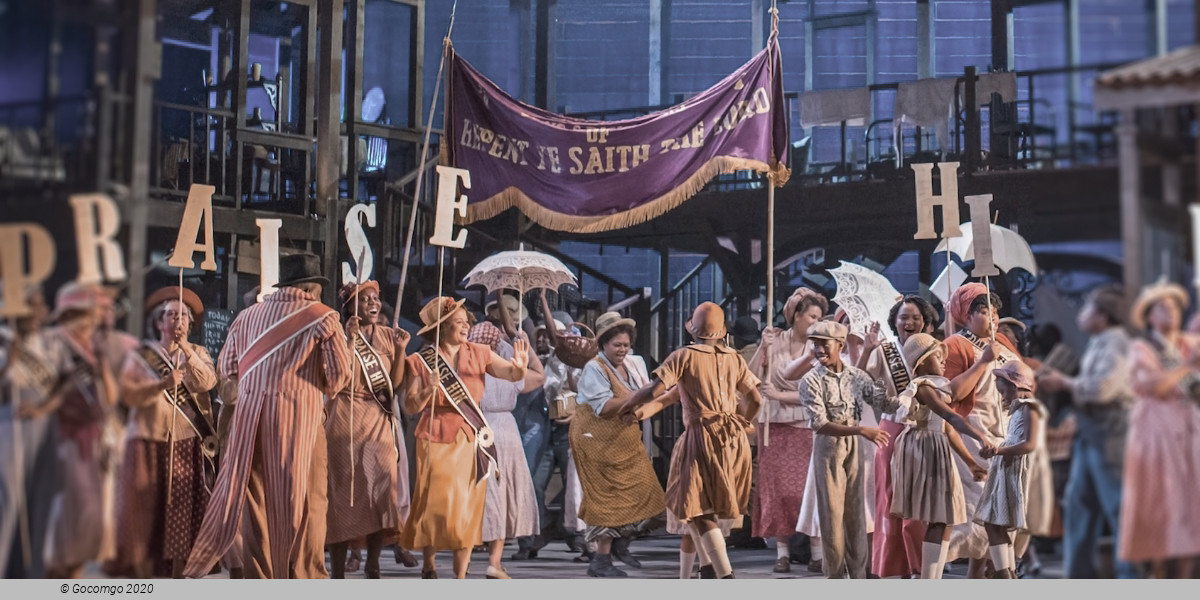
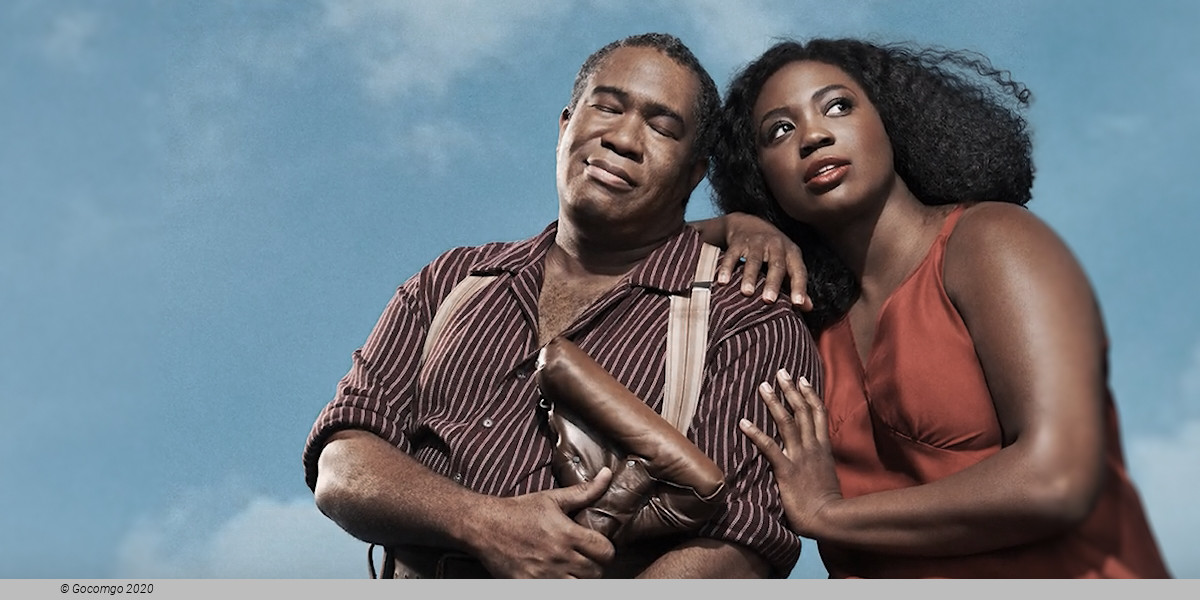
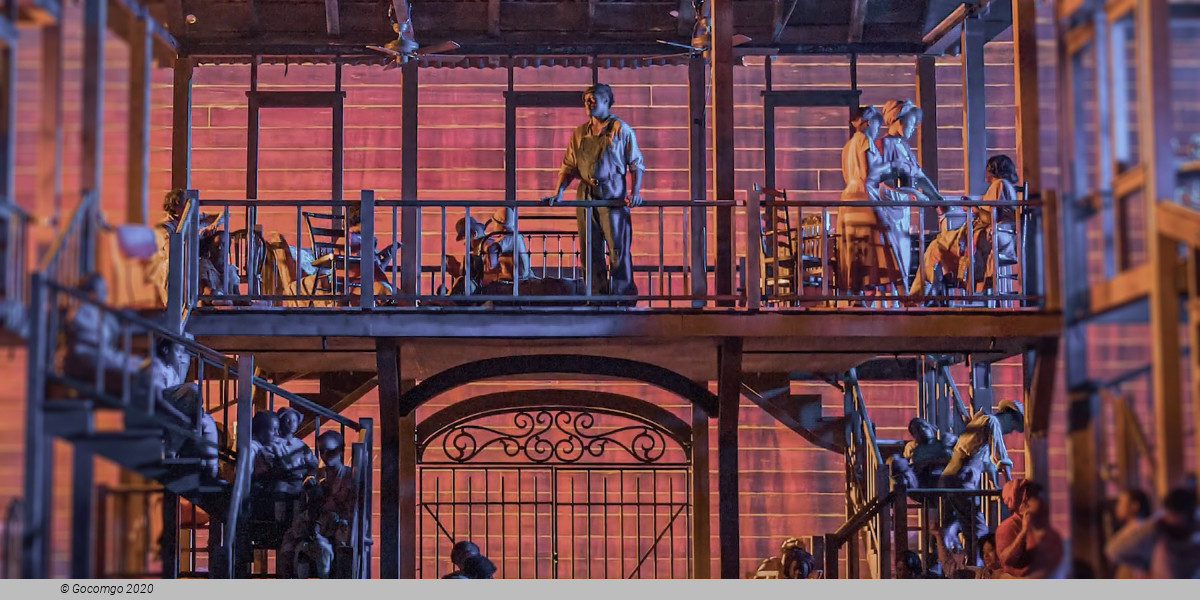
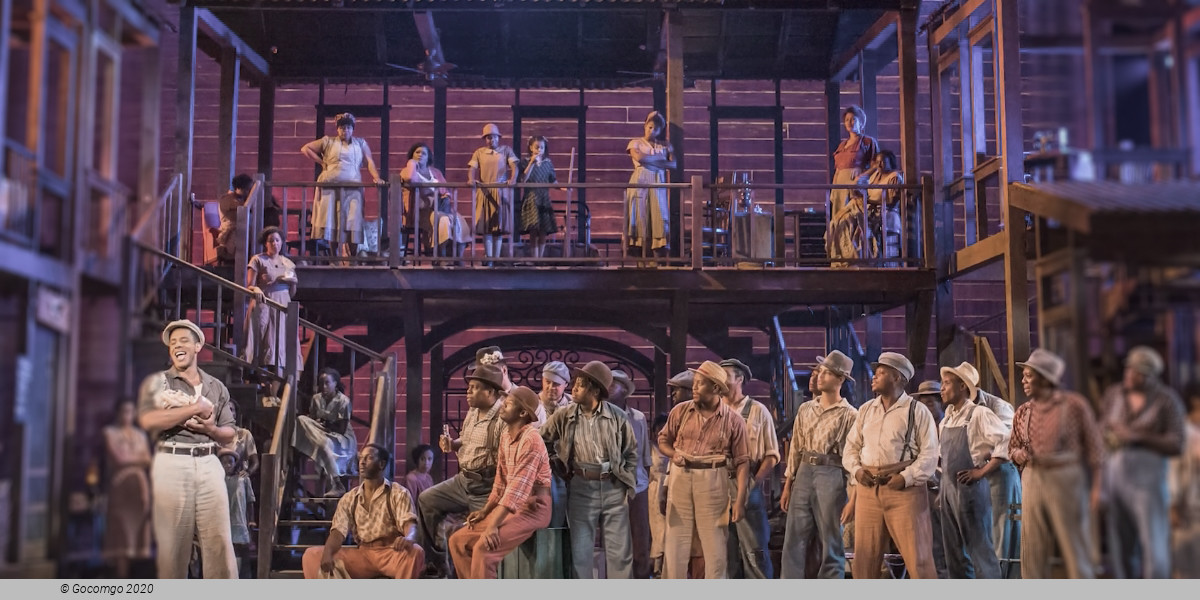
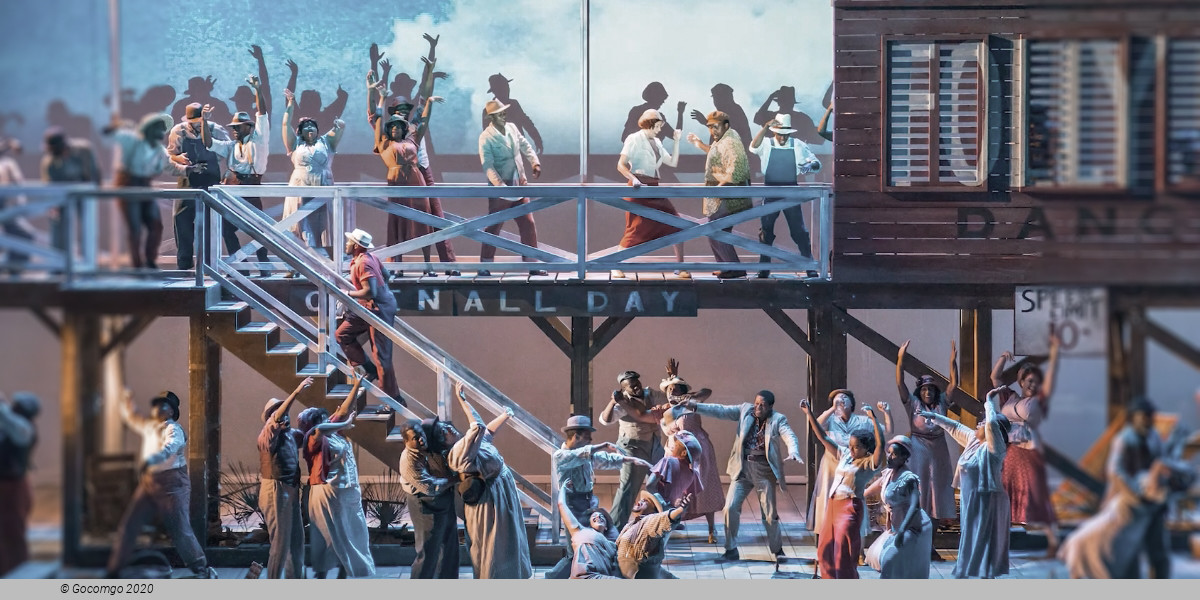
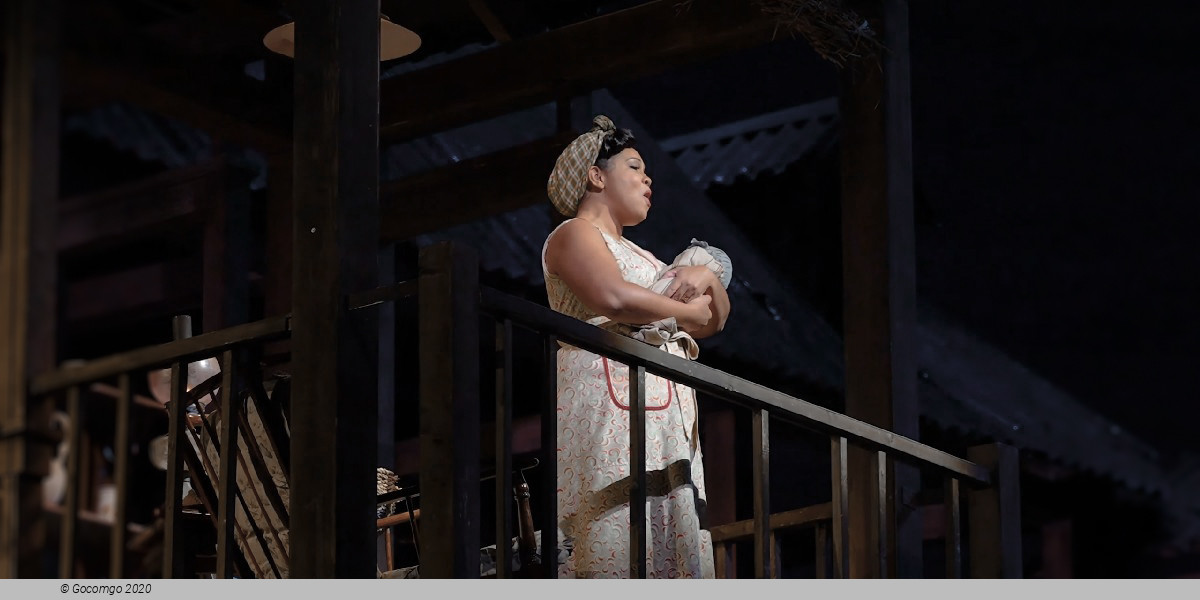
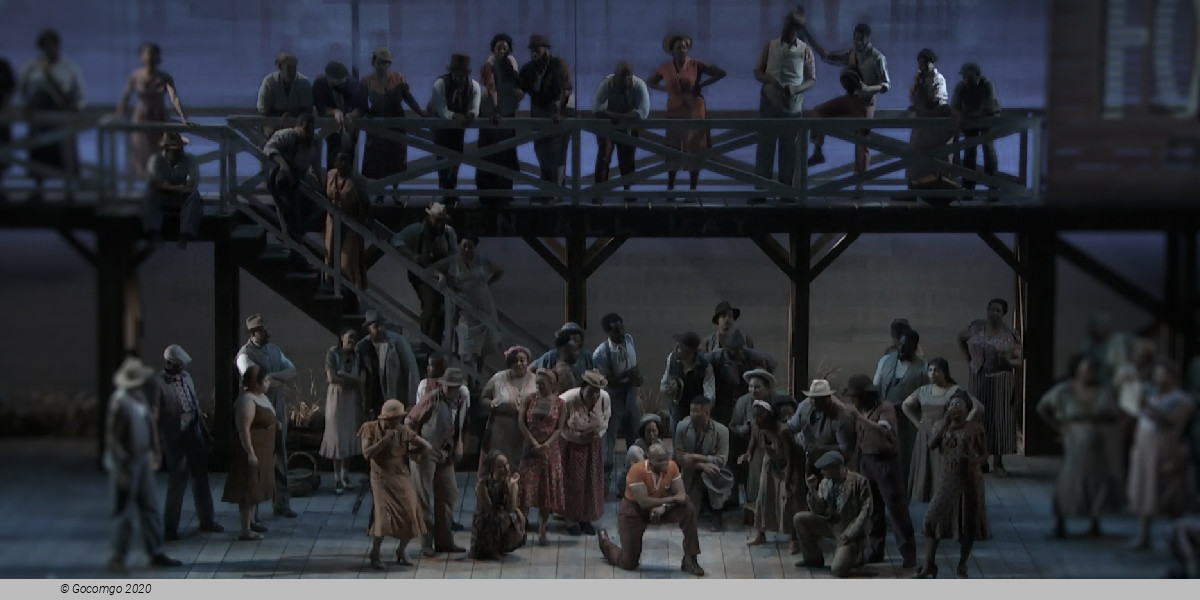
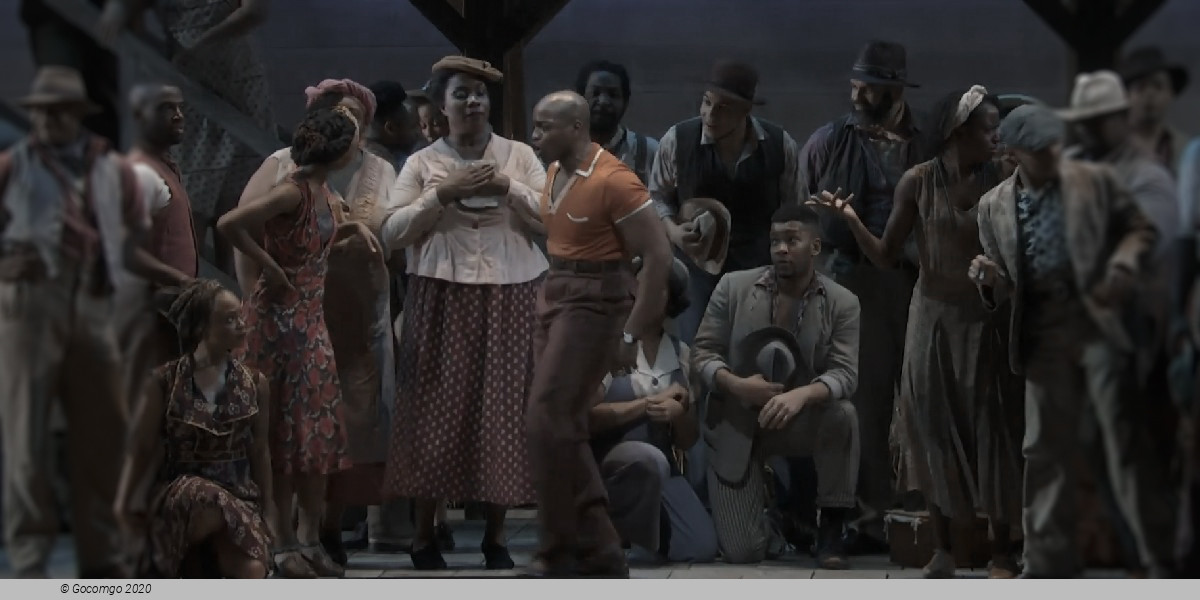
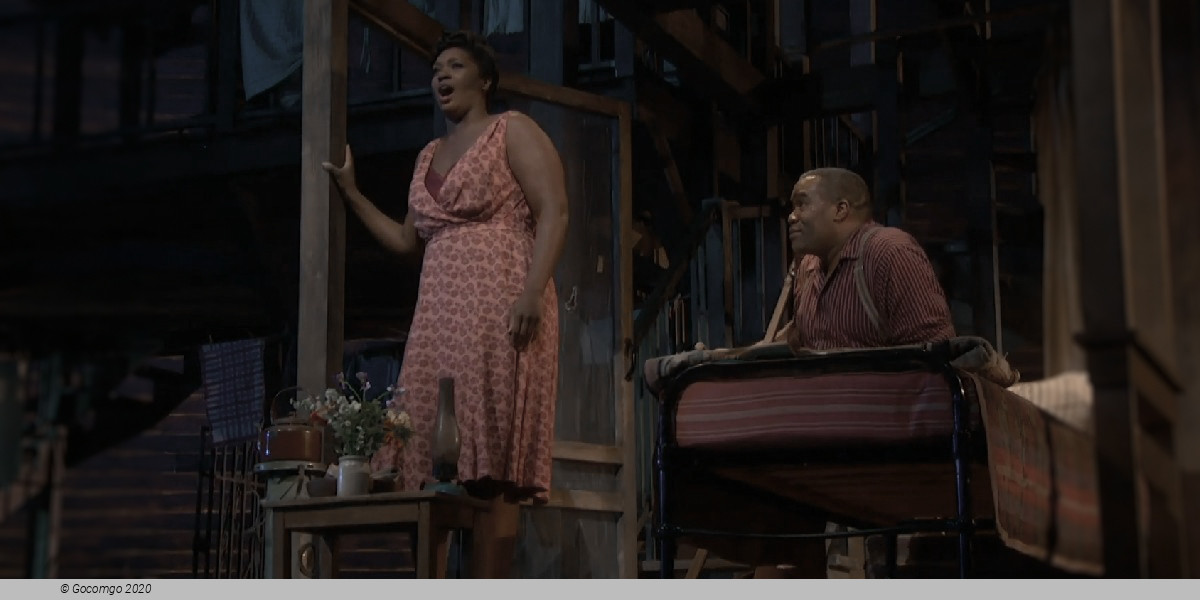
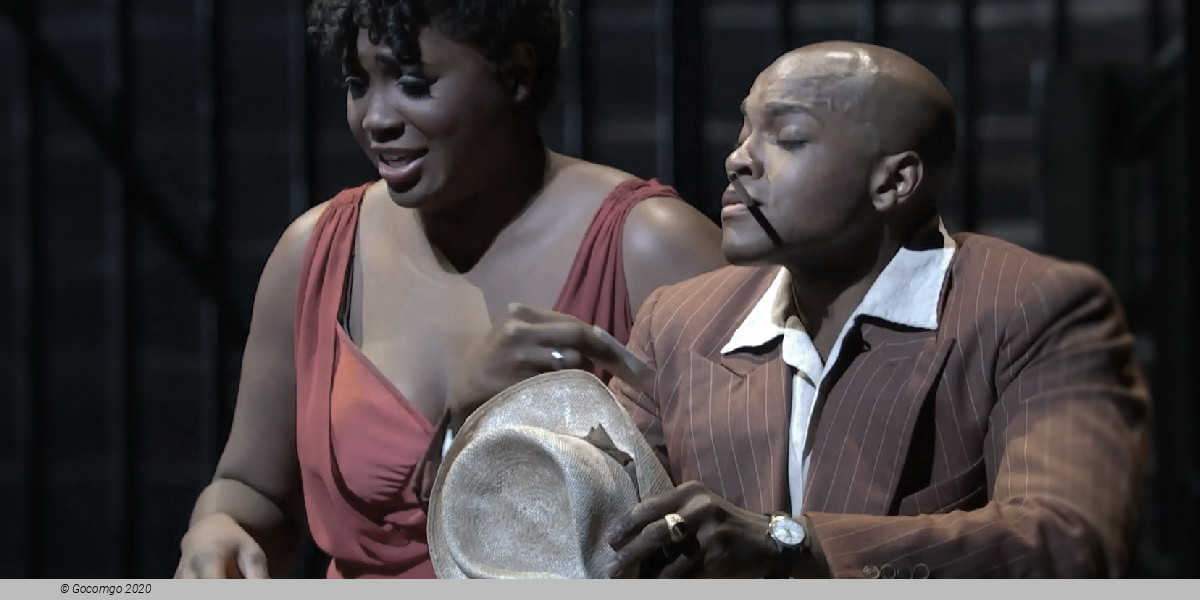
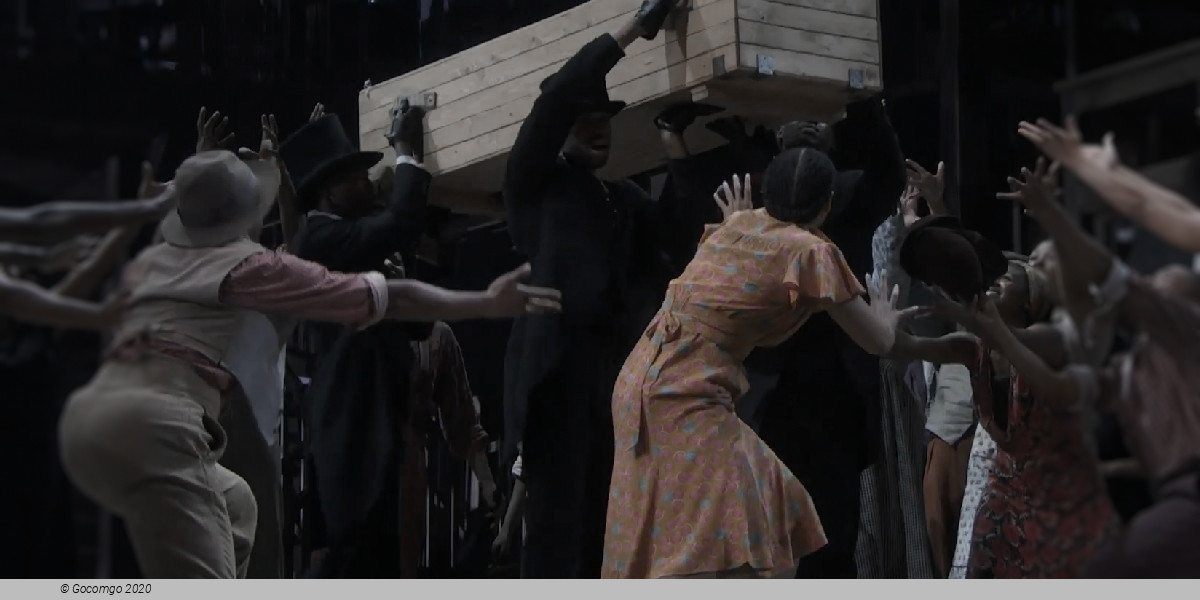
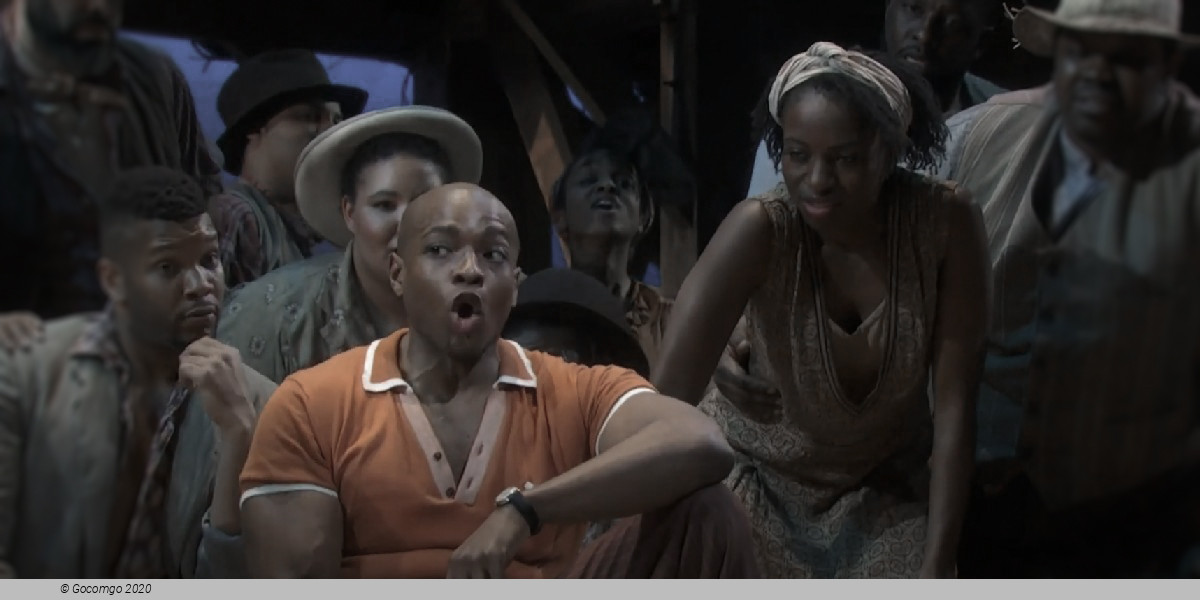
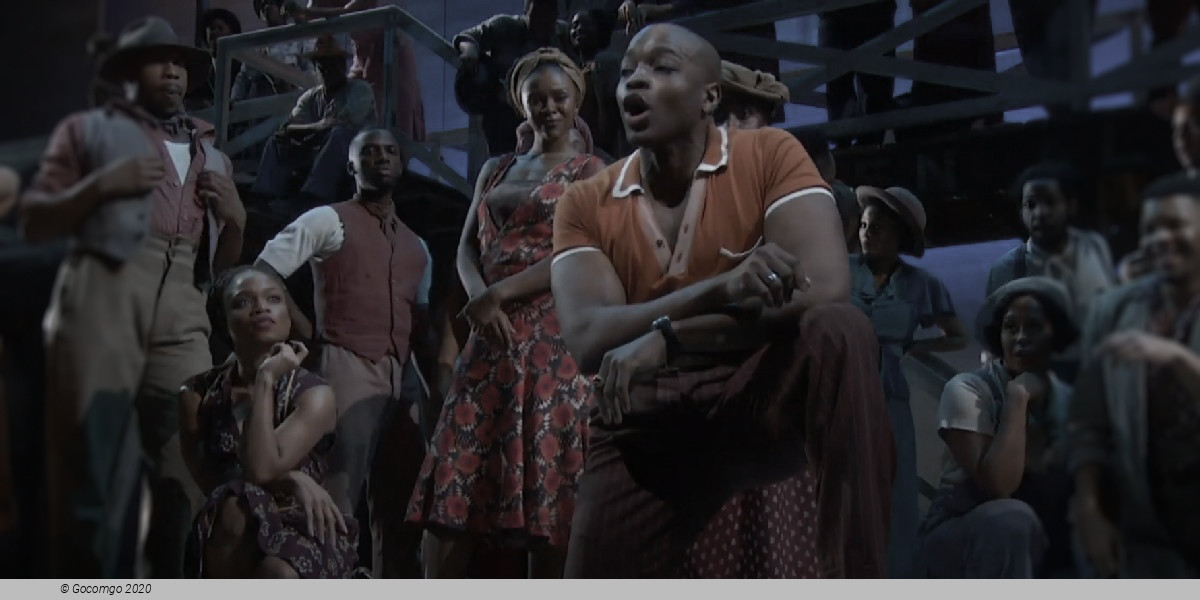
 30 Lincoln Center
30 Lincoln Center